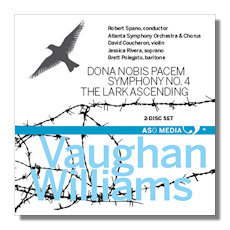
The Internet's Premier Classical Music Source
Related Links
- Vaughan Williams Reviews
- Latest Reviews
- More Reviews
-
By Composer
-
Collections
DVD & Blu-ray
Books
Concert Reviews
Articles/Interviews
Software
Audio
Search Amazon
Recommended Links
Site News
 CD Review
CD Review
Ralph Vaughan Williams

- Dona nobis pacem *
- Symphony #4
- The Lark Ascending **
* Jessica Rivera, soprano
* Brett Polegato, baritone
** David Coucheron, violin
* Atlanta Symphony Chorus
Atlanta Symphony Orchestra/Robert Spano
ASO Media CD-1005 2CDs 83m
As the heading indicates this double-disc set has about eighty-three minutes worth of music, just a tad too much for a single disc, but woefully short for two. Thus, ASO Media is selling it for the price of a single disc, making it a bargain – a bargain, that is, assuming the performances are good. I've written before about the Vaughan Williams nine symphonies: outside of the UK they are largely neglected and not necessarily highly regarded either. To me, the Vaughan Williams symphonies are as important a body of works as the fifteen by Shostakovich. In fact, I'll go further: Vaughan Williams was more consistent than Shostakovich, turning in lesser works in only three instances, with Symphonies 1, 3 and 8. (Some would assert I'm wrong about #3 – but I can only say this austere work has never appealed to me.)
The 1934 Fourth here is one of VW's stronger efforts: it is a turbulent work, with a warlike demeanor in the angry first movement and other passages later on. That opening panel is dominated by a four-note motto that returns in the Scherzo and Finale, crushingly so in the final pages of the latter. The second movement has a hauntingly dark main theme on strings, the first four notes of which suggest the first movement motto. The ensuing Scherzo is relentless in its drive and menace, and the finale closes with what seems to be an ominous warning. It would appear, as many have claimed, that the composer was prescient in this work in that he suggests another war in Europe was on the horizon. In six years, of course, that war would begin.
Robert Spano's way with the Fourth is not greatly different from other successful versions by Boult and Slatkin, though his tempos are a bit more expansive than any version I know. Spano captures the ever-present sense of tension and darkness in the symphony with well judged accenting and deftly applied dynamics. His orchestra plays splendidly throughout, in the end yielding a very convincing version of this great symphony. Boult is hard to beat in this repertory, but Spano turns in a fine account still, and in much better sound.
The Lark Ascending is a very popular work that always seems to succeed as long as you have a talented violinist in the solo part. Here, David Coucheron, concertmaster of the Atlanta Symphony, does a fine job in this lovely, lyrical work. Tempos are moderate and work quite well in this mesmerizing piece, which exudes flowing and gentle lyricism almost from beginning to end.
On the first disc is Vaughan Williams' 1936 Cantata Dona Nobis Pacem, for soprano, baritone, chorus and orchestra. While the Fourth Symphony may well hint at war, Dona Nobis Pacem (Grant us Peace) directly takes on the subject of war. For its centerpiece the composer uses a setting of Walt Whitman's Dirge for Two Veterans, which Vaughan Williams had written in 1911 but did not use. It is the most dramatic and moving of the work's six movements, beginning with warlike rumbles from percussion and moving onto a lament over the death of two soldiers in the American Civil War, a father and his son who fell in the same battle. The music turns militant and then glorious, but returns to a lamentational mood. The whole work is stormy and restless throughout, and contains some of the composer's finest vocal and choral writing. Soprano Jessica Rivera and baritone Brett Polegato turn in fine work and the Atlanta Symphony Chorus is excellent as is usually the case. Robert Spano once again shows he's fully in sympathy with the music of Vaughan Williams, as he captures the work's expressive soul, from its threatening omens and tragedy to its sense of humanity and glorious hope for peace. A powerful and moving performance from all parties here.
As suggested, the sound reproduction is vivid and well balanced throughout. Informative album notes and full texts are provided. Highly recommended.
Copyright © 2014, Robert Cummings



















